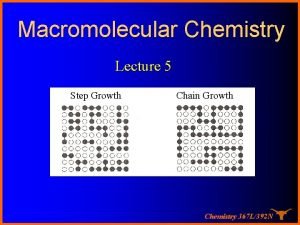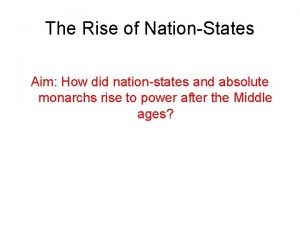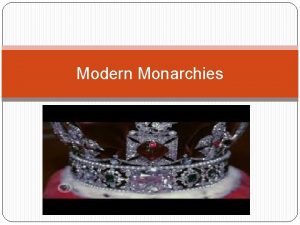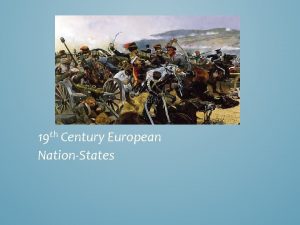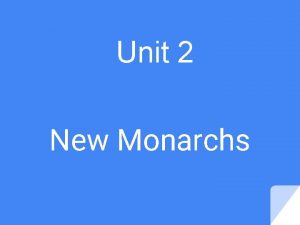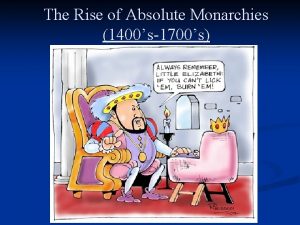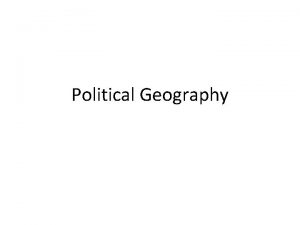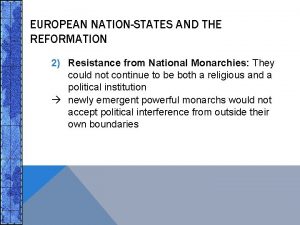RISE OF EUROPEAN NATIONSTATES THE GROWTH OF MONARCHIES


















- Slides: 18

RISE OF EUROPEAN NATION-STATES THE GROWTH OF MONARCHIES

England • Invaded by Angles and Saxons in the 5 th century – The seven Anglo-Saxon kingdoms remained independent and separate for several centuries – Then Danes, Vikings from Denmark, invaded England conquered several of these kingdoms – The English turned to Alfred the Great, king of the kingdom of Wessex, to fight the Danes – He was successful and drove the Danes to the north • The Danelaw – a territory in northern England under Viking control • King Alfred the Great was recognized as the ruler of all England

– As king in the late 9 th century, Alfred reorganized the army, issued his own code of laws, and improved the financial system – He also established a system of schools • William the Conqueror and the Norman Invasion – In 1066 the English king dies without an heir and two men claim the throne • Harold – an Anglo-Saxon nobleman • William – Duke of Normandy and distant relative to the king • The English nobility name Harold as their new king • William feels cheated and decides to take throne by force

– Oct. 14 th, 1006 – William of Normandy lands with his army on the shores of England • Harold, who had just defeated an army of a Viking leader who also wanted to be king of England, marches south to fight William • William defeats King Harold at the Battle of Hastings and becomes the new king – He is now known as William the Conqueror – One of the first things William does as king was to claim all the land in England as his • He divided the land into fiefs and gave it to his Norman knights as a reward • These new nobles owed William their loyalty

– William and the Normans introduced French culture into England • French becomes the language of the nobility and the court • Only lower classes and peasants speak English – Domesday Book – census taken on where people lived, what they owned, and how much they could afford to pay in taxes • William used this to create a central tax system • Henry II – Enlarged the power of the monarchy and expanded royal courts – Body of common law replaced varying local codes • Law common to the whole kingdom

– Since the time of William the Conqueror, many English kings gained power from the acquisition of new lands, many of them in France • English kings were already the Dukes of Normandy, also gained the Dukedom of Anjou when Henry II’s father died – Henry married Eleanor of Acquitaine, an heiress whose father left her a fief that was one-third the size of France and the former Queen of France • Henry now owned half of France and in theory was a vassal to the French king • King John and the Magna Carta – Youngest son of Henry and Eleanor

– Many nobles started to fear that the kings would abuse their powers and take away nobles’ rights – King John was fighting a war, in which he lost almost all of England’s French holdings, and needed money • He placed a new tax on the nobility • The nobles refused to pay and instead rebelled against their king • King John is defeated on the battlefield – He is forced to sign the Magna Carta – “Great Charter • Gives rights to the nobles that the king can’t take away and places limits on the king’s power • King can no longer arrest and punish people without following legal procedures • Set forth ideas about limiting gov’t and executive power

• Edward I – Another rebellion by nobles in the 1260 s led to the foundation of a council that eventually developed into Parliament – Edward I was the first to clarify the role of Parliament • it included nobles, clergy members, and representatives from every county and town • Had the power to create new taxes and advise the king on lawmaking – The Parliament had two houses • House of Lords • House of Commons – Edward saw Parliament as a tool for strengthening the monarchy rather than limiting it

France • In 843 the Treaty of Verdun had divided the Carolingian Empire – The west Frankish land formed the core of France – However the kings after Charlemagne did not rule much territory at all • Mostly limited to the area around Paris and Orleans – Most of France was in the hands of powerful nobles, including the king of England • These nobles owned more land had more power than the king and ruled as they pleased • In 987 the last Carolingian king dies and the nobles choose Hugh Capet to be the new king

– At first the Capetians had little real power • The royal domain was only the territory around Paris called Ile-de-France – Later Capetian rulers gradually extended the power of their monarchy throughout France and by the 1300 s they ruled almost all of France • Philip II Augustus – His rule was the turning point in the growth of the French monarchy – He took back French territories from war – Increased the income and power of the French monarchy

• Philip IV the Fair – Began the first French parliament, the Estates. General – Meeting of the three estates (classes) • First Estate = clergy • Second Estate = nobles • Third Estate = commoners

Holy Roman Empire • This was the German area and had been the eastern part of Charlemagne’s empire – It was divided into numerous small states, ruled over by dukes and princes • In the 10 th century the powerful dukes of Saxony became kings of the Germans • Otto I – best known Saxon king – Was crowned Emperor of the Romans for protecting the pope – The territories united under Otto became known as the Holy Roman Empire

• Called holy because it had the pope’s support • Called Roman because Charlemagne had held the title Emperor of the Roman People when he ruled that area – The Holy Roman Emperors made decisions and passed laws with the help of the dukes and princes • These dukes and princes maintained full authority in their own lands – Starting in the 1100 s, Holy Roman Emperors no longer inherited their titles, but were elected • Seven Electors had the right to elect the new emperor • Frederick I and II tried to conquer Italian lands and failed

Spain • Spain had been conquered by Muslims in the 700 s – Called Moors by the Christians – Christians ruled only a few small kingdoms • These Christian states embarked on a series of campaigns to retake their lands from the Muslims – Called the Reconquista = reconquest – It was led by the largest of the Christian kingdoms, Castile – These Christian kingdoms won victory after victory over the Moors – In the 1100 s Portugal was able to completely free itself

– The last Muslim stronghold was defeated in 1492 with the defeat of Granada • A major step in unifying Spain occurred with the marriage of Isabella of Castile and Ferdinand of Aragon in 1469 – They pursued a strict policy of conformity to Catholicism – 1492 – all professed Jews were expelled from Spain, followed by the Muslims – To be Spanish was to be Catholic

Russia • Settled by the Slavs • Encountered Vikings, who eventually came to rule – Called them the Rus – One Viking leader, Oleg, settled and created the Rus state known as the principality of Kiev • Grand Duke Vladimir I of Kiev gave up his old beliefs and converted to Christianity – He made Christianity the state religion of Kievan Russia in 988 – Set up a semi-independent church in Russia that would become the Russian Orthodox Church

• In the early 13 th century the Mongols, led by Genghis Khan, invaded Russia – The Mongols left local princes in control, but require them to pay tribute • Alexander, Prince of Novgorod – In 1240 a group of Swedes invaded Russian territory, but were completely defeated by Alexander • This victory saved Russia from a full-scale invasion – Two years later a German military order of knights called the Teutonic Knights invaded • They wanted to force Russians to abandon the Orthodox Church and convert to Roman Catholicism

– Alexander’s army met the Teutonic Knights in an area between two frozen lakes • Alexander lured the knights onto the ice, which cracked • Known as the massacre on the ice – Alexander becomes known as Alexander Nevsky for his accomplishments • Russia was eventually freed from foreign domination in 1480
 Monarchy system
Monarchy system New monarchies
New monarchies A union b example
A union b example Rise and rise again
Rise and rise again Tricky dick: the rise and fall and rise of richard m. nixon
Tricky dick: the rise and fall and rise of richard m. nixon Raise and rise again until lambs become lions
Raise and rise again until lambs become lions Neoclassical growth theory vs. endogenous growth theory
Neoclassical growth theory vs. endogenous growth theory Primary growth and secondary growth in plants
Primary growth and secondary growth in plants Organic vs inorganic growth
Organic vs inorganic growth Plant growth analysis
Plant growth analysis Chapter 35 plant structure growth and development
Chapter 35 plant structure growth and development Root hair structure
Root hair structure Geometric growth vs exponential growth
Geometric growth vs exponential growth Growthchain
Growthchain Thiếu nhi thế giới liên hoan
Thiếu nhi thế giới liên hoan Công thức tiính động năng
Công thức tiính động năng Phối cảnh
Phối cảnh Tỉ lệ cơ thể trẻ em
Tỉ lệ cơ thể trẻ em Một số thể thơ truyền thống
Một số thể thơ truyền thống













